Rabbi Mangel Revisits Concentration Camp
Visited Auschwitz-Birkenau today with my Zaidy and two cousins. It was incredible to be with him as he relived his experience. My Zaidy chokes up and says: “My mother didn’t let go of me. There’s nothing like a Jewish mother, never abandoning her child” • Full Story, Photos
From the Facebook of Laizer Mangel
Visited Auschwitz-Birkenau today with my Zaidy and two cousins. It was incredible to be with him as he relived his experience.
“We left my home town Kosicze and were caught in Bratislava, where we were held and then taken by train to Auschwitz.
After getting off the miserable cattle car, a Polish Sonderkommando told my mother that if she left my side, she would have a better chance of surviving, for every mother together with her young child were sent to the ovens. She gripped my hand tighter. He came back and repeated his words again. My mother tightened her grip. The next time around, he realized she wouldn’t budge. He told her that just the day before, a woman refused to let go of her child so they took the baby, tied one leg to one car and one leg to another, and split the baby in half in front of the mother’s eyes.”
My Zaidy chokes up and says: “My mother didn’t let go of me. There’s nothing like a Jewish mother, never abandoning her child.”
Dr. Mengele ימ”ש sat on a table with his legs dangling, smoking a cigarette, deciding with his thumb ‘מי לחיים ומי למוות’- who is to life and who is to death.
My mother and my older sister Trudy were separated from my father and I. My father, being a broad man, tried shielding me in hopes that Mengele would not notice me. But he did, and asked me how old I was. I was 10 and very small- barely looking my age, but I said I’m 17 years old. He chuckled, yet motioned with his thumb for me to join my father. נסי נסים. Miracles of miracles.
We were marched into a room where we stripped our clothing, and then we entered a chamber. A faucet was turned. Cold water came out.
“Why were you chosen to live?” my grandfather is asked by someone who stopped to listen.
My grandfather looks up, point to heavens, and says one word. “G-d.”
“One of the most noticeable things about the camp is the tall smokestacks. The stench coming from the crematorium was horrid. They made the chimneys tall so that it wouldn’t be so bad. Often, there wasn’t smoke coming out of the smokestacks, there was fire.”
“I managed to be placed in the most difficult workforce- the job of being harnessed to a massive wagon filled with construction materials, and with five others, pull it to different locations sometimes miles away. A task meant for oxen. But I knew that one day I may be made to pull this cart to the women’s camp, thereby giving me a chance to possibly see my mother and sister.
And so it happened. The first time I entered the women’s camp, I was surrounded by many- I was the first child these women had seen in months. They started hugging me and kissing me, imagining that I was their Yankle, their Moishe, their little Shlomie, who were put into the ovens. They showered me with love, giving me extra bread that they had gathered from their kitchen job, extra sweaters, and extra socks. I asked them the whereabouts of my sister.”
“Mangel? I think there’s a Mangel in the barrack over there,” they said.
“I made my way over to that barrack, and someone cried out ‘Nissen!’ I didn’t recognize her. It was a girl with no hair, a white face, no cheeks.
“Who are you?” my Zaidy asked her.
“Trudy!” she answered.
“I still couldn’t believe that this was my sister. I asked her my father’s name. My mother’s name. She answered correctly. This was my sister Trudy.
I gave her whatever she needed from the collection that I had from the women in the kitchen.
The next time I came, I had procured salami for her.”
“Who ever heard of having salami in Auschwitz? And who ever heard of someone in the men’s camp making their way to the women’s camp? If you tell another survivor, they’d tell you it simply didn’t happen,” my Zaidy tells my cousins and I and those listening in.
“The Nazis went shooting as a sport. But they didn’t use targets. They just lined up fifty Jews instead. There was one commander who sat on his porch holding a cigarette in left hand, and holding a gun in his right hand, casually shooting any Jew in sight.”
My Zaidy picks up a handful of pebbles and flings them in the air.
“To them, we were worth less than the stones on the ground.”
“I got sick, and ended up in a barrack in Lager F- where twins, dwarfs, and anyone else Mengele used for his experiments, were kept. I was on the top of a three tiered bunk, burning up with scarlet fever. Mengele came in with other officials, discussing that he was in the midst of a project to discover how to make mothers more prone to having twins. See, he was scared there would be a shortage of young men, as they were all being sent up to the front to fight. He told the other officials that he was to puncture one of my nerves connecting my brain and my heart, and he wanted to see if I would get paralyzed, or die. When I heard this, I jumped down to the floor, and yelled:
“Don’t experiment on humans- experiment on monkeys!”
Mengele was taken aback. No one ever stood up to him. Even generals didn’t defy him. I noticed the revolver on his belt. He didn’t reach for it. He left the room. I was just waiting for the car to arrive to take me to the gas chambers. It never came.
“Why didn’t Mengele do anything to you?” my Zaidy is asked.
My grandfather looks up, points to the heavens, and says one word. “G-d.”
“The Russians were coming. The Nazis made a Death March. The camp was split. I realized the more able bodied people were in one line, and the everyone else in the other. I was in the wrong line. I jumped into the line with the more healthy prisoners. I thought no one saw… well almost no one saw- aside from Ukrainian POW’s, who although were prisoners themselves, hated Jews as much as the Germans. They beat me and delivered me to an SS guard, who threw me back into the other line. I made another attempt. This time no one saw.
We marched for days. We weren’t given food- we ate dirty snow from the ground. If someone found a worm to eat, they considered it holiday.
My oversize shoes dug into my skin, eventually revealing my bones. The pain was so immense, I saw stars. כל כוכבי השמים. Every single star in the sky. Eventually I couldn’t take it anymore. I told the young man marching in front of me to make sure to remember exactly where we were, and to remember my name and family details. That way, when I step out of line to be shot, he’ll know where I perished so that if he eventually meets any of my family, they can mark my grave and know when to commemorate my Yahrtzeit.
He said there’s no way he’s leaving me to die. He held me over his back, while I was trying my best to help him carry my weight with my one leg still partially functional. We went on like that for a few days, until I felt that my time had come. I would slip off his back and let the angel of death come for me. At that moment, an SS officer approached. I thanked the young man for carrying me for so long, and said my last prayers. But the officer didn’t shoot. Instead, he handed me his black coffee. I drank it, and was overcome with a new strength to continue. The officer walked beside me for a few minutes, asking me about my upbringing, and then left. Every day, until the end of the Death March, this SS officer found me, and handed me a mug of black coffee. Who was this officer? It must have been אליהו הנביא- Elijah the Prophet.
My sister was left in Auschwitz. The Nazis had to move inland, and wanted to kill everyone remaining as fast as possible. My sister was stuffed into a barrack which was doused with gasoline. The Nazis locked the door. But the wooden structure was never ignited – for the Russians had arrived to liberate the camp. Until this day in Holocaust museums around the world, you can see a video of my sister being carried out of the camp by a nurse – because her feet were frostbitten and she couldn’t walk herself. How did she survive?”
My Zaidy looks up, points to the heavens, and says one word. “G-d.”
Standing on the tracks leading into Birkenau, my Zaidy finishes with one last story.
“Shortly after I got married, I was walking with my wife on Orchard St. in Manhattan on a Friday afternoon. A gentleman called out to me to come into his store to get a bargain on good shirts. But my wife reminded me that it was getting close to Shabbos. I told the man that I would come back a different time, that now wouldn’t work for me.
“Why?” he asked.
“I am a Torah observant Jew,” I explained, “and I keep the Sabbath.”
He started to yell at me. “Sabbath? Torah? How can you believe such things? Where was G-d? If you would’ve seen what I saw in Auschwitz, you as well would know it’s all nonsense.”
My Zaidy rolls up his sleeve, and continues: “I showed the merchant these numbers tattooed on my arm, and said “I too was in Auschwitz. And you know why I survived? G-d. And you know where G-d was? G-d was with me. G-d was with you. And G-d is with us.”
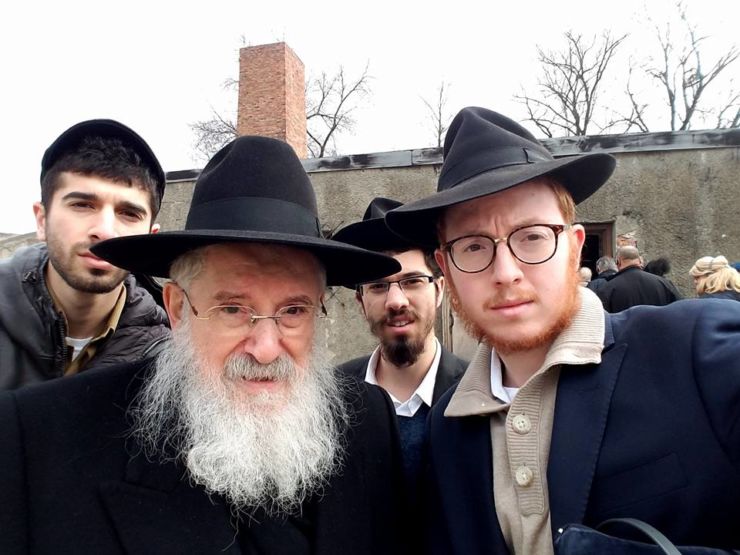


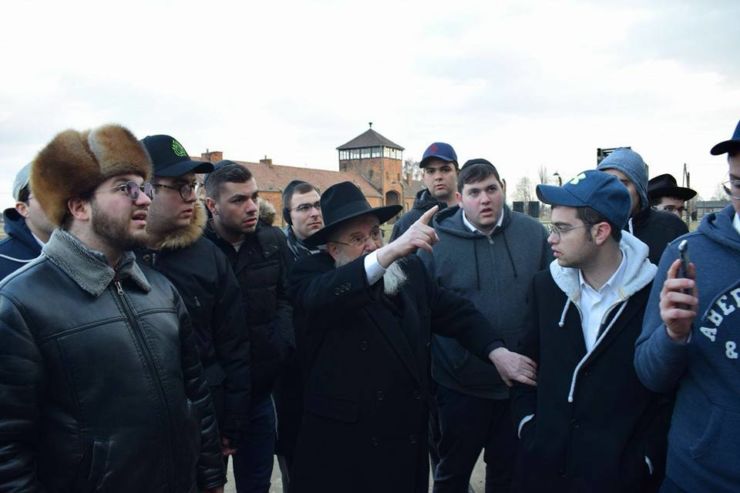


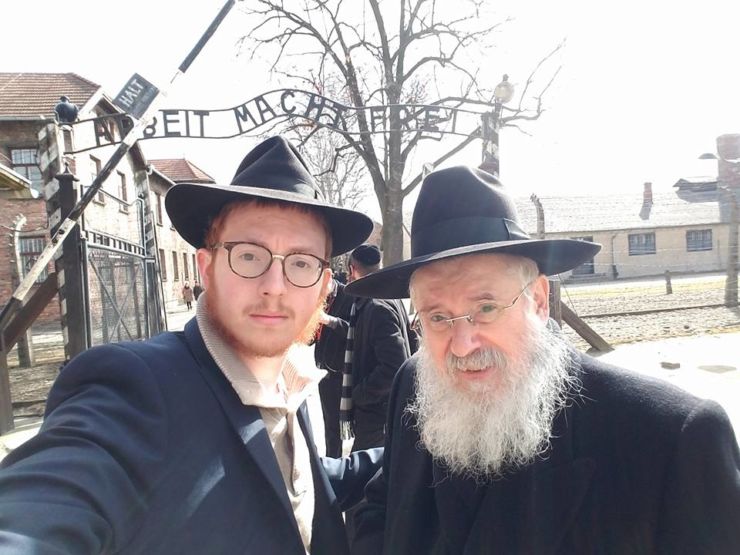


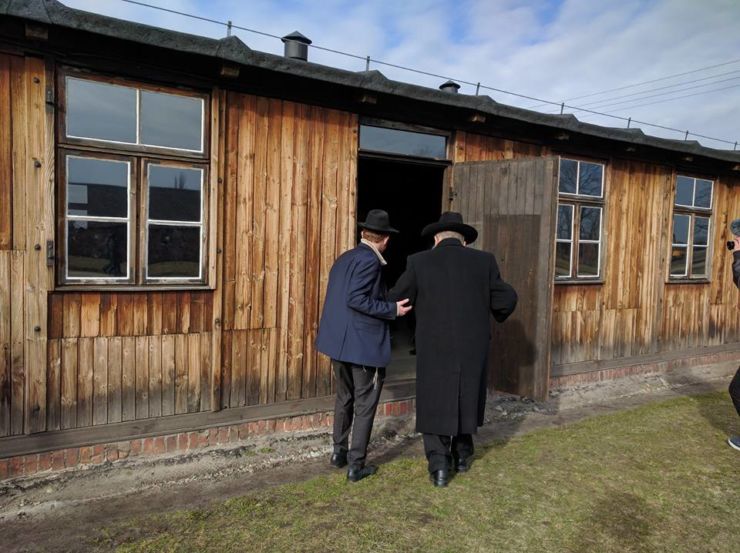


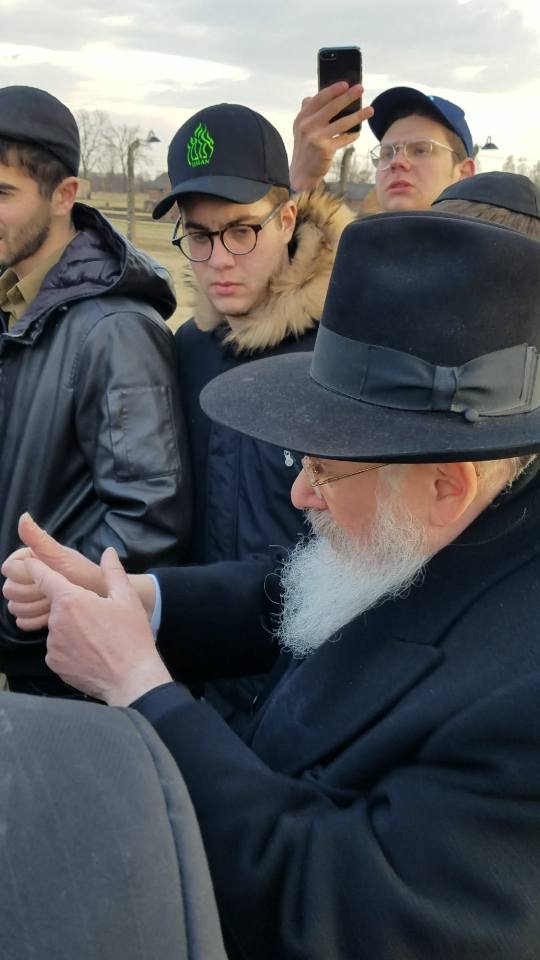


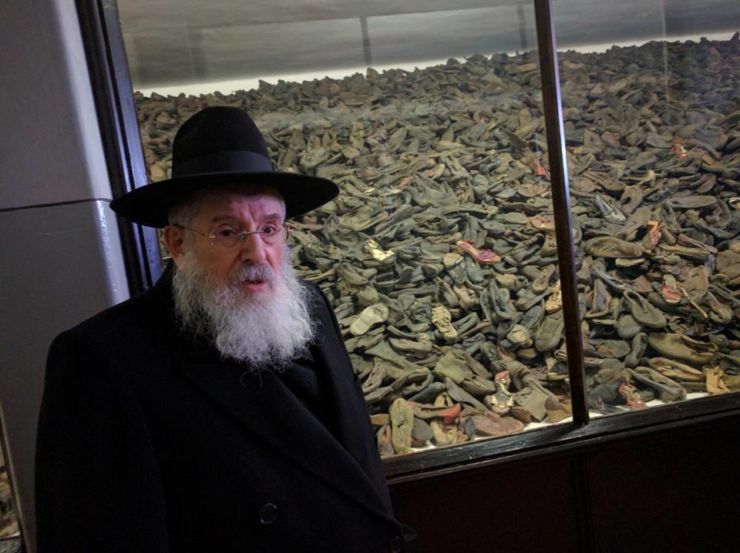





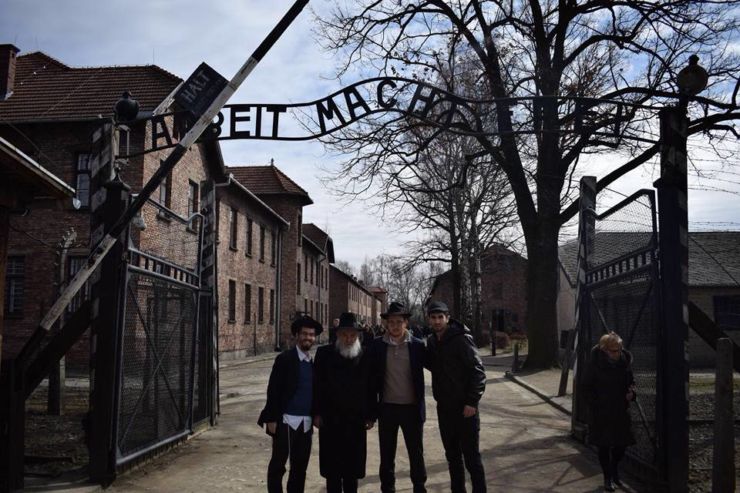


552
Join ChabadInfo's News Roundup and alerts for the HOTTEST Chabad news and updates!










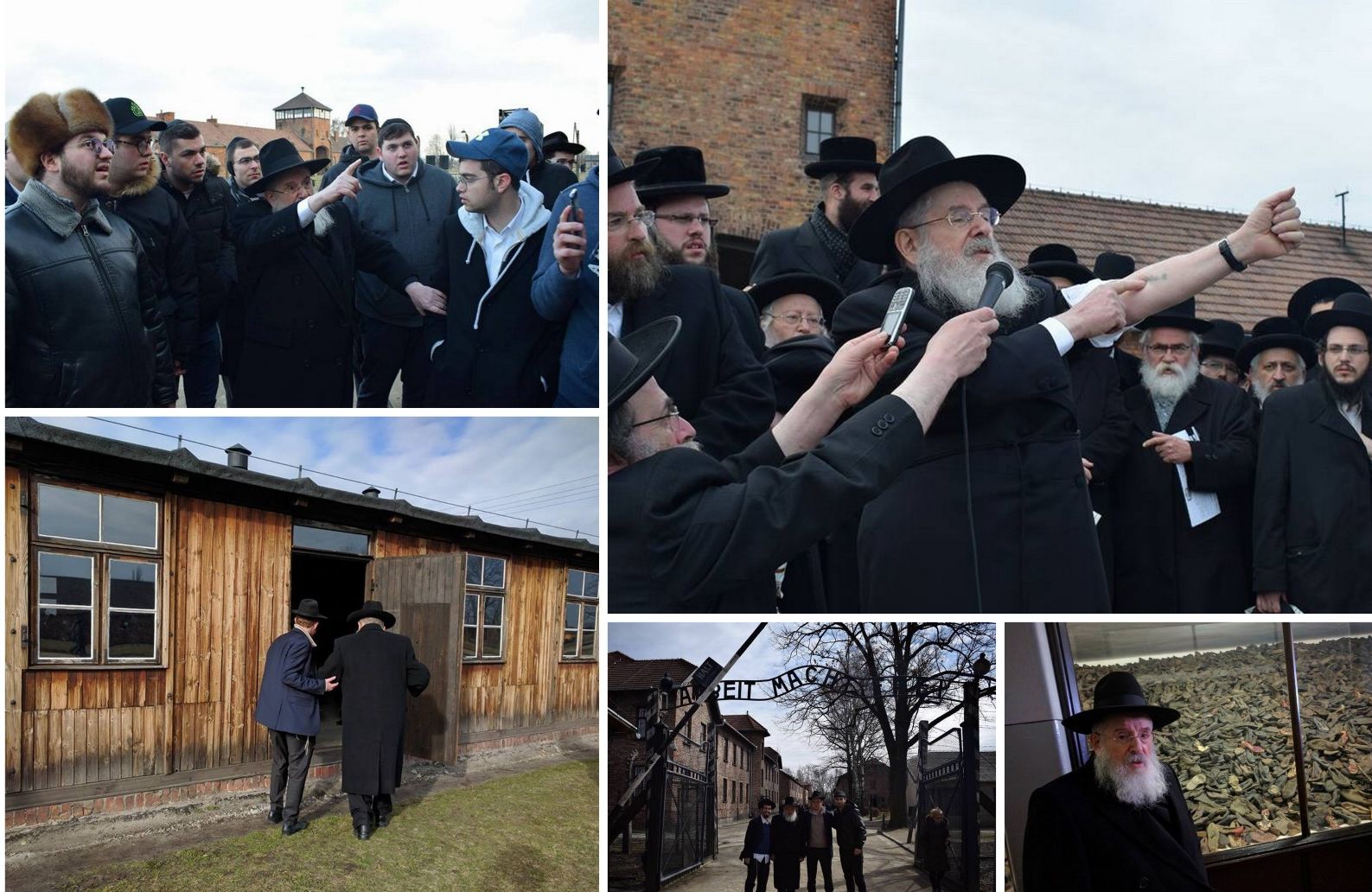









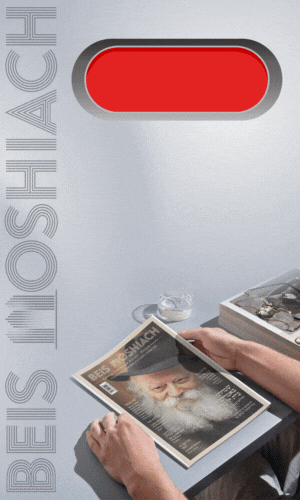






















Hashem should grant him healthy years to greet Moshiach on his own two feet! He deserves nothing less and perhaps a lot more!